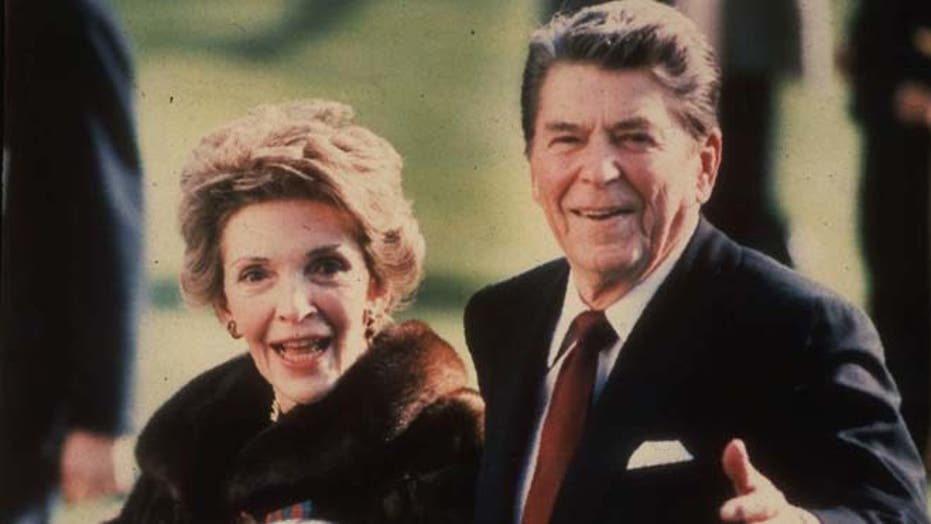It was during one of the darkest hours of Ronald Reagan’s presidency that his wife had one of her brightest moments.
In the midst of the fallout from the Iran-Contra scandal, which saw proceeds of secretive gun sales funneled to Nicaraguan anti-government guerrillas, Nancy Reagan was the prime mover in getting her husband to apologize to an upset nation and world for the humiliating arms deal.
The First Lady brought a slew of political figures to the White House, including Democratic power broker Robert S. Strauss, to help argue her case and finally persuaded her husband to relent. In a nationally televised speech on March 4, 1987, President Reagan made a public apology for the scandal – a speech that helped improve his faltering approval ratings both at home and abroad.
"Even though she wasn't a policy person, she knew what was going on," White House aide James Kuhn said in a University of Virginia oral history interview, according to the USA Today.
The former first lady died Sunday at her home in the Bel-Air section of Los Angeles of congestive heart failure, assistant Allison Borio told The Associated Press.
- Best pix of the week
- Wed in Mass Vows in Nicaragua
- Teens With Cancer Get Their ‘Quinceañera’ in Nicaragua
- Nicaragua Contra Leader Adolfo Calero Dies at 81
- Iran Launches Spanish-Language Television Station
- Bill Richardson: US Should Arm Syrian Rebels If Assad Gets Russian Helicopters
- Iran Moving In on Latin American Television Market
Besides her quiet role behind-the-scenes in her husband’s administration, her best-known project as First Lady was the "Just Say No" campaign to help kids and teens stay off drugs.
She also championed Alzheimer's patients, raising millions of dollars for research and breaking with fellow conservative Republicans to advocate for stem cell studies. Her dignity and perseverance in these post-White House roles helped smooth over the public's fickle perceptions of the former first lady.
She delved into policy issues, too. She urged her husband to finally break his long silence on the AIDS crisis. She nudged him to publicly accept responsibility for the arms-for-hostages scandal. And she worked to buttress those advisers urging him to thaw U.S. relations with the Soviet Union, over the objections of the administration's "evil empire" hawks.
Anne Frances Robbins, nicknamed Nancy, was born on July 6, 1921, in New York City. Her parents separated soon after she was born and her mother, film and stage actress Edith Luckett, went on the road. Nancy was reared by an aunt until 1929, when her mother married Dr. Loyal Davis, a wealthy Chicago neurosurgeon who gave Nancy his name and a socialite's home. She majored in drama at Smith College and found stage work with the help of her mother's connections.
In 1949, MGM signed 5-foot-4, doe-eyed brunette Nancy Davis to a movie contract. She was cast mostly as a loyal housewife and mother. She had a key role in "The Next Voice You Hear ...," an unusual drama about a family that hears God's voice on the radio. In "Donovan's Brain," she played the wife of a scientist possessed by disembodied gray matter.
She met Ronald Reagan in 1950, when he was president of the Screen Actors Guild and she was seeking help with a problem: Her name had been wrongly included on a published list of suspected communist sympathizers. They discussed it over dinner, and she later wrote that she realized on that first blind date "he was everything that I wanted."
They wed two years later, on March 4, 1952. Daughter Patti was born in October of that year and son Ron followed in 1958. Reagan already had a daughter, Maureen, and an adopted son, Michael, from his marriage to actress Jane Wyman. (Later, public spats and breaches with her grown children would become a frequent source of embarrassment for Mrs. Reagan.)
She was thrust into the political life when her husband ran for California governor in 1966 and won. She found it a surprisingly rough business.
"The movies were custard compared to politics," Mrs. Reagan said.
The Associated Press contributed to this report.












































